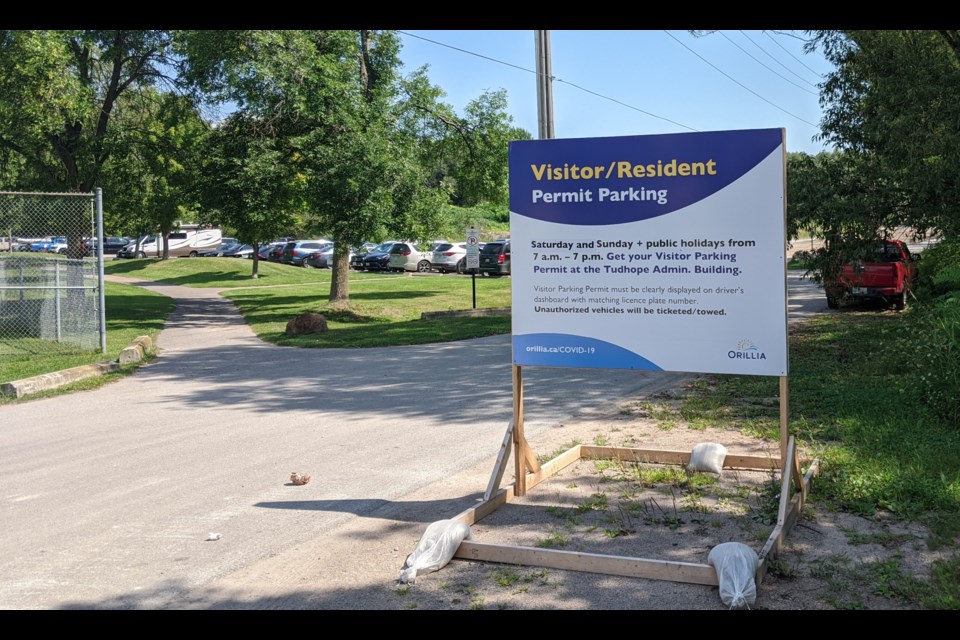The numbers have been crunched, and, contrary to critics who dubbed it a “cash grab,” the city lost money on its hastily-implemented short-term waterfront parking program this summer.
In July, amid growing concerns about large crowds at city parks and fears about the spread of the coronavirus, the city moved to limit visitors by introducing $50 parking fees for out-of-town residents parking at city beaches and $50 fees for visitors who wanted to launch their vessels at municipal boat launches.
At the time, Orillia Mayor Steve Clarke stressed it was necessary to “take decisive action to limit the amount of people visiting our waterfronts."
In a video message to the community, the mayor said: "I want everyone to know this is not about the dollars," noting the program comes with "significant costs" to implement and enforce. "This is a COVID safety measure."
In a report to city councillors this week, the city’s CAO, Gayle Jackson, said the program “achieved its goal of reducing the crowd sizes at the beaches and parks in response to COVID-19 health and safety concerns.”
But it was not a money-maker. And it was a logistical and tactical challenge that tested the city’s resources.
“The short-term waterfront parking and boat launch program presented significant challenges to implement in such a tight timeframe,” noted Jackson’s report.
“Management staff worked additional hours to process the permits, organize and arrange signage as well as execute and deliver the program.”
While management staff’s hours were not tracked as part of the program’s overall budget, the hours invested were significant and became intensive for those involved.
She said there were 22 staff shifts per day required at the parks and boat launches. The program ran on weekends for nine weeks - a total of 32 days - which accounted for approximately 700 total staff shifts.
“The program required more than 75 unique staff members to work at least one shift, with all city departments lending support in order to deliver the program,” noted the report.
After being flooded with requests for temporary permits from city residents, some staff had to be re-allocated to shorten wait times.
“Staff are to be commended for their extraordinary efforts to implement and manage this program in such short order,” noted Jackson’s report.
According to the report, more than $65,000 was spent on staffing - which only relates to those hired specifically for the program and doesn’t include management time nor Municipal Law Enforcement Officers' time dedicated to enforcing the program.
About $23,000 was spent on marketing and communication, which included everything from signage to radio ads on Toronto stations such as TSN 1050 and CFRB 1010, boosted social media posts and digital ads.
In addition, more than $5,700 was spent on operating supplies, while $1,235 was spent on processing fees for customers that used credit cards.
On the revenue side, the city brought in $70,840 in daily permit parking revent and more than $14,300 in boat launch revenue.
With $95,000 in expenses and more than $85,000 in revenue, the city lost more than $10,000 on the program.
That is not taking into consideration revenue from the tickets levied. By Aug. 9, we reported that more than 620 tickets had been handed out. Each carries a $100 fine.
However, Jackon’s report says the value of the parking ticket revenue “cannot be determined at this time, due to a variety of factors such as contested tickets that are currently in the process of evaluation, unpaid tickets, and the fact that courts are not yet open to deal with such violations.”
She added “the staff time required to handle the increase in tickets being contested and/or the time required to prosecute the tickets is not factored in the financial summary either.”
Jackson’s report also included statistics about the number of permits issued to city residents.
Overall, more than 8,800 permits were processed. The report noted 5,613 online permits were issued, while 3,210 permits were issued on-site at either Tudhope Park or Couchiching Beach Park.
The report noted “qualitative feedback received from City of Orillia residents was appreciation for the program and the positive impact it had on dealing with the crowding issues experienced at the parks and beaches.”
However, staff and members of council received numerous complaints from neighbouring township residents about “their inability to utilize the parks and beaches for free in a city they predominantly do all their shopping in.”
The report also noted several merchants in the downtown felt the program, specifically Lot 12 which was the dedicated visitor lot for the downtown waterfront parks, was “a detriment to their business success.”
And closing Terry Fox Circle to traffic during the program “received positive feedback, as it meant that Couchiching Beach Park was that much safer for pedestrians during the peak park usage times.”
But “there were also complaints regarding the closure, and that residents and non-residents were not able to utilize the circle for site seeing and/or to serve as a dropoff point for cargo and people.”
